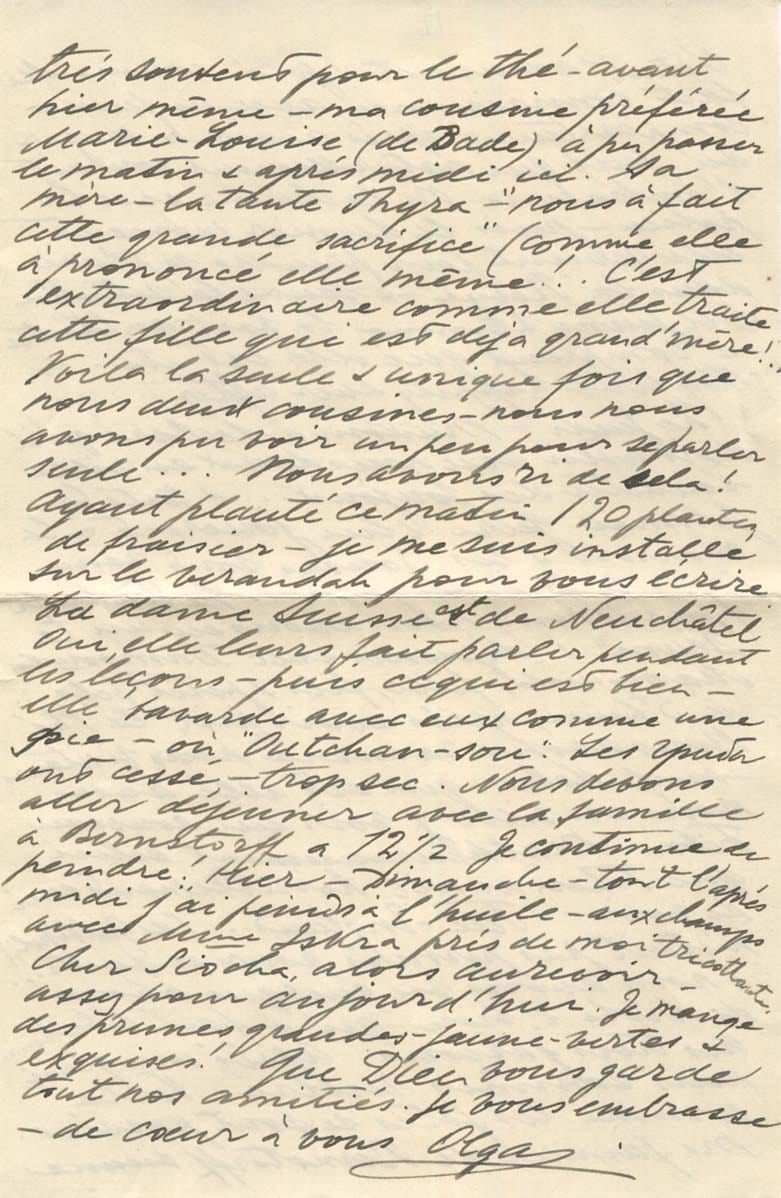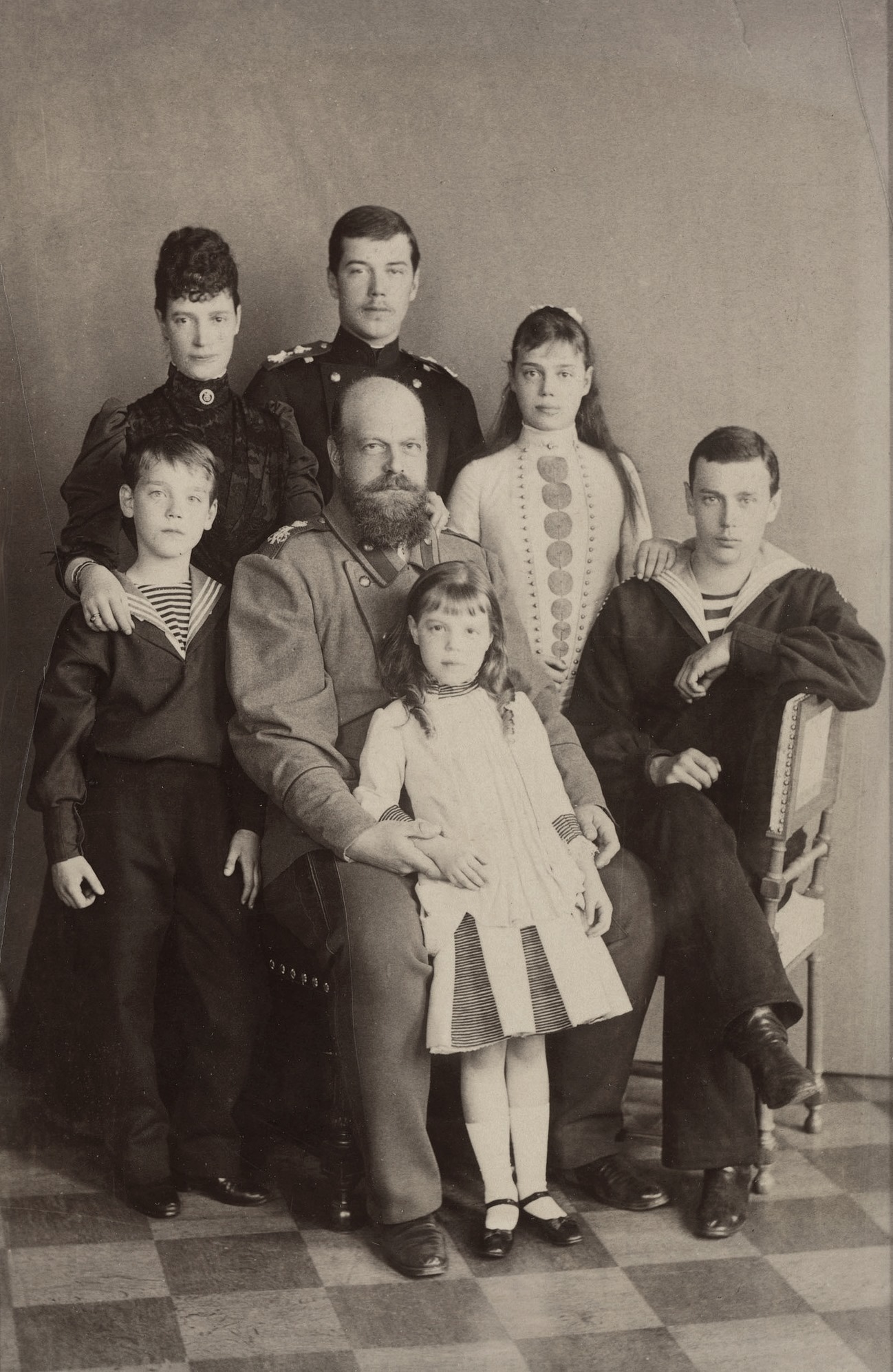Antique Signed Letter from Grand Duchess Olga Romanov Russia to Thormeyer 1924
4.9 (702) In stock

bibelotslondon deal in ephemera and curiosities from Britain and around the world Our diverse inventory is carefully chosen and constantly evolving
bibelotslondon deal in ephemera and curiosities from Britain and around the world. Our diverse inventory is carefully chosen and constantly evolving. We work very hard to offer the highest quality works at competitive prices and we may be able to source specific pieces for our clients upon request. Our inventory is listed online, and we strive to keep our website completely up to date, so our customers can easily check availability. We believe in offering clients items that are unique and rare for aficionados of the antique's and collector's world. Fine antique signed letter dated 23rd October 1922 from Grand Duchess Olga Alexandrovna (1882-1960), written whilst in exile in Copenhagen to her former tutor Ferdinand Thormeyer (1858-1944), sending Easter greetings and the health of her mother and sister. She further goes on to discuss the theft of Gobbelin tapestries from her former home, sending cabbages to people in Trotsk, which she sometimes still calls Gathcina. Money is evidently in short supply and she discusses the burning of her her letters, cajoling Thormeyer for keeping all of his. Dear Siocha, Christ is Risen I wanted to congratulate you in time but unfortunately time slipped away - and so my letter will be late by some days… How are you? I had influenza but not severely and I was on my feet the entire time - merely going to bed earlier at 8 o' clock after the children. Mother and Xenia have had the same illness - just as bad- not sleeping. I feel completely weak - but went out yesterday… The children, thank God, are well. It is pouring with rain and it is not more than 4 degrees of temperature… Nothing turns green any more. Thank you again for your [trouble]: the money was sent to us - which was very good for us! For sure you have read - or heard - that the poor Petia has died in Golfe-Juan. He had phthisis, which went to his brain and he died from tuberculosis meningitis, being unconscious for some days. Militza and Petyusha were close to him and very good - we have the details from her, who wrote a long letter with lots of emotion… Your dear letter reached me straight away; that confused me greatly, that it has truly been so long that I have not written to you… But - my postcard was after your letter… Your letter is charming and I am delighted and will try to reply to your questions and to everything that you say to me. How much time that will take - this letter will only come perhaps for our Easter. My dear old Emilia Ivanovna went to the Church all malcontent this morning that it is Easter here - when she feels Russian and our Easter is only a week away. Yes, that is dull but for us it is better because we celebrate with everyone once - then - we have our Church celebration and it feels even more like a Church celebration, do you understand? So you have just as much work with your cradled one - poor Siocha… I am writing to you on Sunday 20th, Easter. Yesterday was our Palm Saturday [sic] and we went to Church. That still reminds of Gatchina! Before Church (which was at 5 o' clock…) we and the children were invited to the house of the Armenian minister, Mr Prince - where there were some more children and all of the group looked for eggs hidden all around the bedrooms. There were no toys, only chocolate, marzipan and sugar eggs… It was very amusing. My two, with red cheeks and shining eyes, were running, searching, shouting, and brought me all their trophies - they had an entire basketful! (that I locked away so that they were not eaten before our Easter). Then, around a large round table the chocolate was served… I saw my boys from afar - eating with gusto: the youngest was given a cup of chocolate, then a cup of tea, then a glass of water - he swallowed that with lots of cakes… after which he refused to go to the All-Night Vigil - (I do believe it.) Yes, the other day I received a letter from Malanpoig - he writes to me that everything at home is taken - only the stripped walls remain… That upset me, because I was sure that there things remained… But do you know why all of that has happened? The Polish have taken all the old Gobelins from all the rooms… to take them to the castle in Kraków, where they say that they were taken in the past! Of course when lots of people enter at once in the rooms… all the small things fly away too… We sent xxx of cabbages etc. to many people in Gatchina etc so that they had some vegetables for next winter - all the parcels (without value) arrived well and very quickly. To Myona too but he has not responded yet. I believe that he received your letter - if the address was correct. Berezovaya 3 (the address certainly bears a new and horrible name that I do not know of!) Trotsk is Gatchina but I write that sometimes… Here we see people who return from the Soviets. They all say that they will not live for a long time, that we cannot trust them etc. But all the same -they're all going in there like crows on corpses… The Danish do nothing but leave, xxx me with the air of dogs to whom we have shown a bone - but who have not been given it… No, my children do not sing songs with words, but all sorts of marches they sing. To the cinema, we went one single time - invited - by the same good III Mr Prince (American) - with the children to see an exciting and interesting Indian film etc… about the 1840 armies in California… My children were mad with glee and speak of and play at nothing but that And it was truly good. We had not been in a cinema for 8 years… and I would not go without being invited so as not to spend money and not give a taste of the cinema to the boys… All the youth do nothing but run, is it not so… I do not believe that that is good for them - because they do not know what to do at home - if there is no cinema in the evening. We never go to the theatre. I do not have time to read but now we have some rather interesting books: the lives of the Saints and each morning the children's maid - the nun reads aloud to us while I paint - and the children draw. We do not need to read other books - that gives you much to think about. Each of these days - after our influenza - I go to bed at 8 o' clock. Immense joy. The children come to jump on the bed and the little one falls asleep in my bed on my arm! That is very [comforting… Truly what is the use of all your old letters? Burn them! I burned everything before the war myself and all that remained, my little Vronovskii burned things for me straight after the beginning of the revolution and now I burn all my letters. Yes, what you say on the past is true. How singular it is: we want to save some trace… and then we see how all of that is useless in the end! I believe I wrote to you as we went with the children to the museums: ethnographic, Kamanalvik and Egyptian. All of that deeply interested them… My little flowers (two kinds of primrose) are holding up well - from Christmas - think how long that is, is it not? Our priest is a source of joy, loves us dearly and he comes often and stays to chat. I cannot tell you how remarkable he is - what a strong and admirable soul - and such things he knows. What a long letter. I could continue to write a lot, but there is no time. Perhaps for another time. Goodbye dear Siocha. Warm regards from the heart and good wishes. The old Olga who loves you. 7/20 April 1924. Olga was the youngest child of Emperor Alexander III of Russia and younger sister of Tsar Nicholas II. She was raised at the Gatchina Palace outside St Petersburg . Olga's relationship with her mother, Empress Marie, the daughter of King Christian IX of Denmark, was strained and distant from childhood. In contrast, she and her father were close. He died when she was 12, and her brother Nicholas became emperor. In 1901, she married Duke Peter Alexandrovich of Oldenburg, who was privately believed by family and friends to be homosexual. Their marriage of 15 years remained unconsummated, and Peter at first refused Olga's request for a divorce. The couple led separate lives and their marriage was eventually annulled by the Emperor in October 1916. The following month Olga married cavalry officer Nikolai Kulikovsky , with whom she had fallen in love several years before. During the First World War, the Grand Duchess served as an army nurse at the front and was awarded a medal for personal gallantry. At the downfall of the Romanovs in the Russian Revolution of 1917, she fled to the Crimea with her husband and children, where they lived under the threat of assassination. Her brother and his family were shot by revolutionaries. Olga escaped revolutionary Russia with her second husband and their two sons in February 1920. They joined her mother, the Dowager Empress, in Denmark. In exile, Olga acted as companion and secretary to her mother, and was often sought out by Romanov impostors who claimed to be her dead relatives. She met Anna Anderson, the best-known impostor, in Berlin in 1925. After the Dowager Empress's death in 1928, Olga and her husband purchased a dairy farm in Ballerup , near Copenhagen. She led a simple life: raising her two sons, working on the farm and painting. During her lifetime, she painted over 2,000 works of art, which provided extra income for both her family and the charitable causes she supported. In 1948, feeling threatened by Joseph Stalin's regime, Olga emigrated with her immediate family to a farm in Ontario, Canada. With advancing age, Olga and her husband moved to a bungalow near Cooksville , Ontario. Colonel Kulikovsky died there in 1958. Two years later, as her health deteriorated, Olga moved with devoted friends to a small apartment in East Toronto. She died aged 78, seven months after her older sister, Xenia. At the end of her life and afterwards, Olga was widely labeled the last Grand Duchess of Imperial Russia. Ferdinand Thormeyer - Siocha to his imperial correspondents - came from the Geneva district of Carouge , and was appointed French tutor to the children of Alexander III in 1886, when he was 28. He stayed with them until 1899 and remained close to them, and to Russia, in spirit and through letters for the rest of his life. Even after returning to Switzerland in 1899, he remained strongly attached to Russia. During the First World War he was a Red Cross delegate, and visited Russian prisoners of war. He set up a Russian corner in his house with the souvenirs he had collected - gifts, postcards, photos, telegrams, the menus of imperial breakfasts, details of the timetable and composition of trains used by the tsar and his family. He died childless in 1944 Photographs form part of the Description Size: 13.5 x 21 cm approx
Autograph letter signed, four pages - on two conjoined sheets (both sides), 5,25 x 8 inch, Ballerup (Denmark), 26.10.1932 (whilst in exile*), in

Grand Duchess Olga Alexandrovna of Russia Autograph

Grand Duchess Olga Alexandrovna of Russia - Wikipedia

Olga Alexandrovna Paintings & Artwork for Sale

Olga Alexandrovna Paintings & Artwork for Sale
-5679-p.jpg?v=6575e63e-9b78-4e7e-8455-67ab0bc37f14)
Antique Signed Letter from Grand Duchess Olga Romanov Russia to Thormeyer 1924

children's book Auctions Prices

Grand Duchess Olga Alexandrovna of Russia - Wikipedia

JOURNAL OF A RUSSIAN GRAND DUCHESS: Complete Annotated 1913 Diary of Olga Romanov, Eldest Daughter of the Last Tsar – The Romanov Family

Olga Alexandrovna Grand Duchess of Russia autograph letter signed & mounted
File:Olga Šípková – signature.png - Wikimedia Commons
File:Olga Tokarczuk signature.svg - Wikipedia
Coast RTA - Congrats to Olga and Design the Sign! We
OLGA SEGURA hand-signed BEAUTIFUL OUTDOOR 8x10 portrait closeup w/ UACC RD COA
 Soma, Intimates & Sleepwear, Nwt Soma Embraceable Wireless Bra S 42c
Soma, Intimates & Sleepwear, Nwt Soma Embraceable Wireless Bra S 42c- Topshop Tall basic ankle length legging in black
 Mercedes-Benz C-Class review: a luxury car that is affordable
Mercedes-Benz C-Class review: a luxury car that is affordable Everyday Bralette and Brief Set - Lemonade Dolls - Lemonade Dolls
Everyday Bralette and Brief Set - Lemonade Dolls - Lemonade Dolls Big Boobs vs Small Boobs: Here's What We REALLY Think! - India's Largest Digital Community of Women
Big Boobs vs Small Boobs: Here's What We REALLY Think! - India's Largest Digital Community of Women- adidas Sportswear House Of Tiro 3 stripe track jacket in navy and purple

